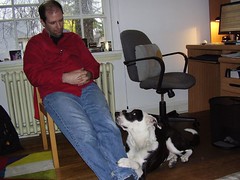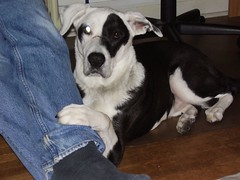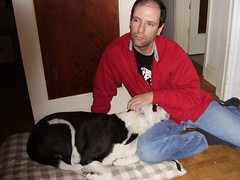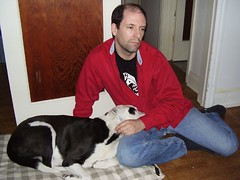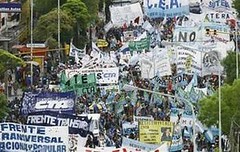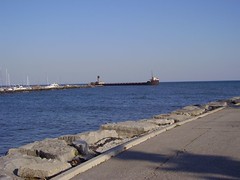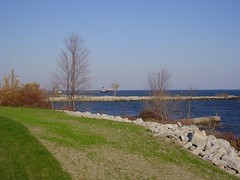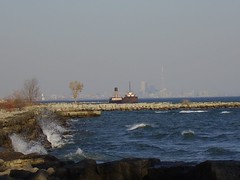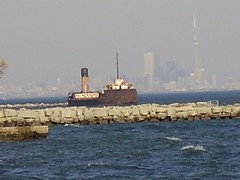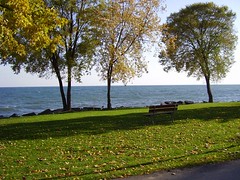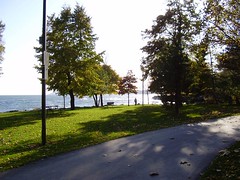Thank you all so much for your thoughts and sympathy. It really means a lot.
We've been treating Buster for two chronic eye conditions, glaucoma and uveitis, for about 15 months. It was a stroke of luck that we caught the glaucoma at all; the disease usually has no symptoms until it's in the very advanced stages. Usually by the time someone brings their animal in, it's too late to save its eyesight. Buster was having a problem with his eyes that kept recurring, no matter what our family vet tried. We took him to a specialist, a veterinary ophthalmologist, and she discovered the glaucoma. The original problem turned out to be unrelated.
This began a long series of trips to the eye doc, tests and various medications. Every trip was very stressful for Buster, and expensive and labor-intensive for us. In New York, we had to rent a car each time, although finding
Zipcar did help a lot. At first the visits were weekly, then every-other week, then monthly and finally every-other month.
Throughout, we've been giving Buster three different kinds of eye drops, several times a day. He doesn't mind at all, in fact, he's used to getting a hug and kiss after a drop, so he wags his tail and gives us a kiss in return. He's such a good boy. The medications are incredibly expensive, but they were working.
Simply put, glaucoma is high pressure in the eyes. Left untreated, it becomes extremely painful, and leads to blindness. Painful blindness. The vet eye doc have always stressed that the disease is not curable, only manageable. As long as the medications are working, you just monitor the eye pressure, and continue the treatment.
We've always known that the condition could worsen at any time, that at some point the medication wouldn't work anymore, and there's no way to know when that might occur.
Our last few check-ups have been status quo. We've had to increase the dosages of the meds to bring the pressure down, but the meds were still working.
The eye doc in New York gave us the name of someone in the GTA, and he seems to be the most well-known veterinary ophthalmologist in the area. Yesterday was our first re-check since we moved.
Buster's eye pressure has skyrocketed. We were shocked.
This means the medications are no longer effective. Which brings us to my breaking heart.
There is laser surgery that can be done, and the doctor wants to do it immediately, to prevent horrible pain and blindness. His job is to save an animal's vision. But my job is to think of Buster. I have to look at the whole picture. If Buster were a normal dog,
or if the surgery had a good prognosis, it would be different. But neither of those things are true.
The surgery is a crapshoot. It has an approximately 40% so-called success rate, but even within that 40%, the glaucoma can return at any time. It can return the next day, the next week, in a few months or in a year. Within the 60%, it can do nothing - or it can lead to serious complications that actually make things worse. It would also mean more frequent visits for follow-up care and pressure checks.
Buster is an animal with a compromised immune system. This is why he has glaucoma, why he has inflammatory bowel disease, and why he was dying from mange when we found him. All these conditions are related to his ill-functioning immune system. In addition, he has a serious anxiety condition. Even with all daily medications (yes, our dog takes Prozac, thank you very much), doctor visits and procedures are even more stressful and frightening for him than they are for most animals.
We've never hesitated to treat him for anything he needed. We never even considered doing otherwise. Not only do we love Buster with all our hearts, but we believe strongly that it's our responsibility. In for a penny, in for a pound. Sometimes you adopt an animal and they're easy-going and healthy (Cody, Clyde). Sometimes they're more challenging and high maintenance (Gypsy, Buster). Buster's re-written our definition of high-maintenance several times over, but we never considered not doing what was needed.
But I also believe strongly that our responsibility is to
him, not us. I have to think of the overall quality of his life, not of my desire to reach beside my bed and feel him sleeping beside me.
I've always felt that as long as the medications were working, we'll just keep on keeping on - but also, that surgery is a different story. Especially surgery that may do nothing or may make things worse.
We've come to a sharp turn in the road, and down that road lies pain and suffering for my boy. I don't want to take one step in it. I don't want Buster to endure six months of suffering, and then eventually we'd have to put him down anyway, just so we can have him with us another six months. I don't want his last weeks or months on earth to be wracked with fear and pain. I'd rather (stupid word, I don't rather) lose him now.
There's an alternative surgery, too. They remove the dogs eyes and put in prosthetic silicon (fake) eyes. No more glaucoma, no more pain, no more vision. I know this sounds extreme, and maybe gross, but many people do this, and their dogs go on to live happy lives, despite blindness.
But Buster is not just any dog. His life is already very small and restricted. He's extremely happy, that's obvious, but I don't want to restrict his life any further by taking away his vision. What's more, we don't know how an anxious animal would react to blindness. Perhaps it would make him even more anxious and stressed, the last thing I want. Or perhaps the surgery itself would tax his poor immune system too much and trigger his IBD or other problems. With a normal dog in robust health, eye-removal might be an option. But that's not Buster.
This is the really awful part of sharing our lives with animals. Every animal-lover knows it going in, but it never gets any easier. And everyone draws the line at a different place. We've seen people put their dogs down for conditions that seemed highly treatable to us. But I've always known so many people who kept their dog or cat alive in the saddest, most reduced circumstances, simply because they couldn't say goodbye. I'm not making a judgment here, just an observation. I have vowed to myself that I would never do that, that I would always put my dogs needs before my own love for them.
It's killing me. But I know in my heart it's the right thing to do.
Making this even harder, Allan and I are in different places on this. I don't want to speak for him or go into the whole history here. We spent yesterday afternoon talking, arguing, crying, arguing, talking and crying over it. It's very hard.
Right now we're just loading Buster up on meds to keep the pressure below the pain threshold, but that's a very temporary respite.
This sucks.
* * * *
Here's the story of
how we found our boy, and some
history even further back for those who are interested. Here are some
old photos, and some
older photos of the first gang.


